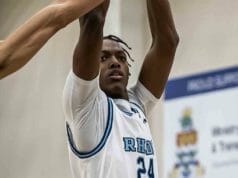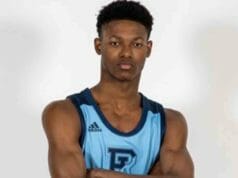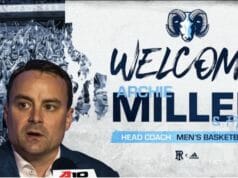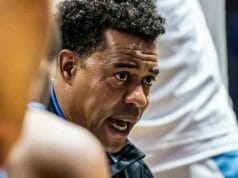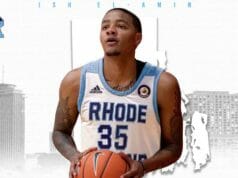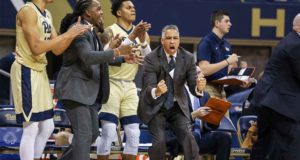
URI’s Jeff Dowtin only knows success since arriving in Kingston, making back-to-back trips to the NCAA Tournament. The 6-3 point guard wrapped up the 2017-18 campaign, his sophomore season, by averaging 9.6 points, 5.6 assists (2nd in the Atlantic 10) and 3.1 rebounds per game.
With the graduation of several key performers in the backcourt, the rising junior enters this summer as one of the program’s veterans — eager to take the next step as a leader and ensure the Rams continue battling for conference supremacy.
Atlantic 10 analyst and YurView contributor Chris DiSano recently caught up with Dowtin to discuss his maturation process, leadership, and the program.
Chris DiSano: How have the first couple of months been under new Head Coach David Cox?
Jeff Dowtin: Well, as you know, I’ve been with Coach Cox for a couple of years now so I’ve been used to his coaching scheme and what he does. It is a little different with him as the head coach but he’s ready for this moment and it’s been an easy adjustment so far. It’s been a lot of getting the freshmen involved with it being their first time on a college campus [for summer sessions] so that’s been the main focus, getting them involved, and everyone else has been here before so it’s kind of an easy adjustment.
CD: You talked about it a bit just now, but you’ve had a great relationship with Coach Cox for a long time. For those who might not be as familiar, can you describe your relationship with him?
JD: Coach Cox is like a father figure for me from home. He’s from the Washington, DC area so we have that connection – basketball flows through our veins – and he’s been there for me ever since day one. As he was recruiting me he was always at all of my games, whether high school/AAU – that connection was very strong and one of the main reasons I decided to come to URI, because of that connection we had and have.
CD: Let’s roll it back a little. Another great year, the season comes to an end… with that in mind, what are some of your personal off-season goals?
JD: Coach and I sat down and had a few conversations about my goals for next year and what I want to work on this summer. One of the main things I’m working on is my body and getting stronger. I’ve been in the weight room four to five times per week, doing whatever I’ve got to do to improve my strength, explosiveness, agility and quickness. As far as on the court, working on my shot and being able to shoot off the dribble, get my shot off quickly and effectively.
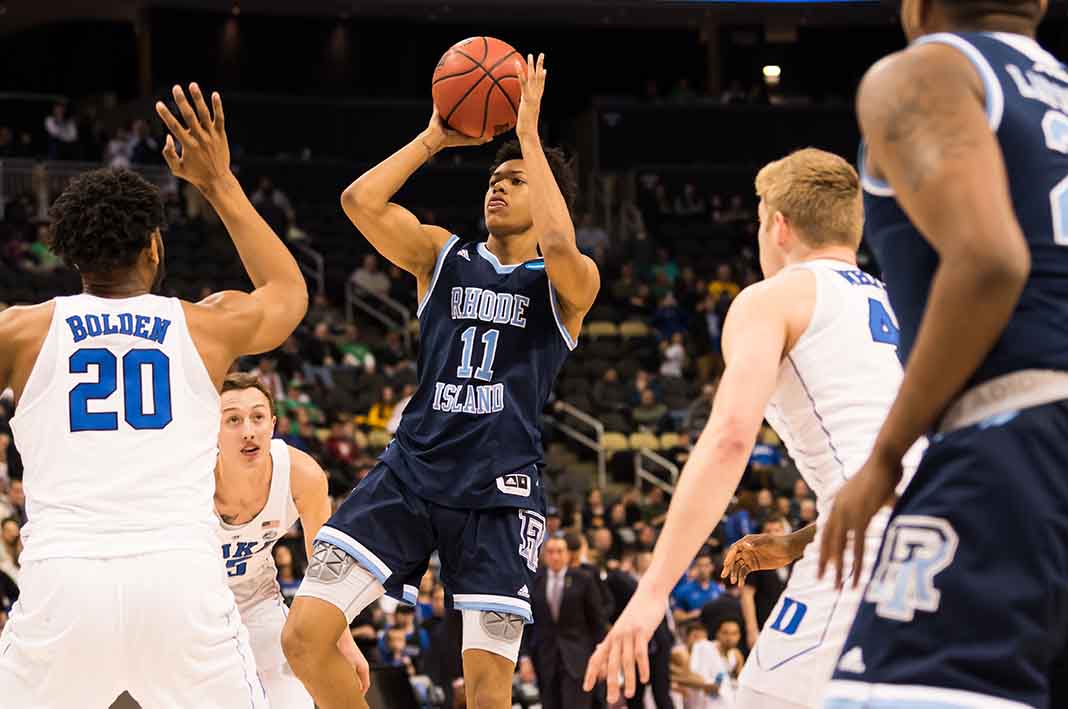
CD: Last year you were one of the nation’s leaders in assist-to-turnover ratio and recorded 189 assists to just 43 turnovers overall. With more of the scoring load falling on you this year, how important is it for you to shoulder and balance that, but still maintain great care-taking?
JD: Yeah, that’s going to be a challenge this year but I think I’m up for the challenge. My assist-to-turnover ratio was one of the main things that made me last year, but I think that also helps me to be able to score the ball too. I’m always looking to find my teammates when they’re open, but at the same time if I need to get a bucket for our club – if I’m feeling hot – I can do that. I can get to the rim and finish, shoot the pull-up, and score behind the three-point line. I’m trying to be more versatile.
CD: Defensively, your length really frustrates opposing guards. What is a particular area of focus for you that allows you to dial in as an on-ball defender: using length, taking angles, communicating?
JD: My length helps me out a lot on defense. Being able to see where the offense going to make their move and reading their moves. It is all about angles. You have to figure out which angle allows you to beat them to the next spot and guess/anticipate what they’re going to do.
CD: What’s the main lesson you’ll keep from the outstanding graduating class of guys?
JD: When you’re an upperclassman, everything falls on your shoulders and you have to embrace the pressure. You can’t just sit back. If you haven’t stepped up to the moment before or you’re a little nervous, there’s no time for any of that anymore. Everything is on you and the best players in the game step up to pressure and they want that pressure on them. As an upperclassman, that’s what you have to accept and I think I’m ready for that.
CD: Since the midpoint of your freshman year when you became a starter you’ve gradually taken on more responsibility. Now that the backcourt leadership has fully been handed over to you and, to an extent, Fatts Russell, have you all talked about how you want to attack things playing together? How do you see yourselves teaming, differing, or evolving at all from the previous backcourts?
JD: Coach Cox always brings up how James Harden (with the Rockets) was playing the on-the-ball role for some time and then Chris Paul came over. They needed to be able to play with each other on and off the ball, that’s how Coach envisions me and Fatts. We’re two point guards who can push the ball if needed, (we) also know how to play off the ball and play off of one another — so I think we’re going to do that this year.
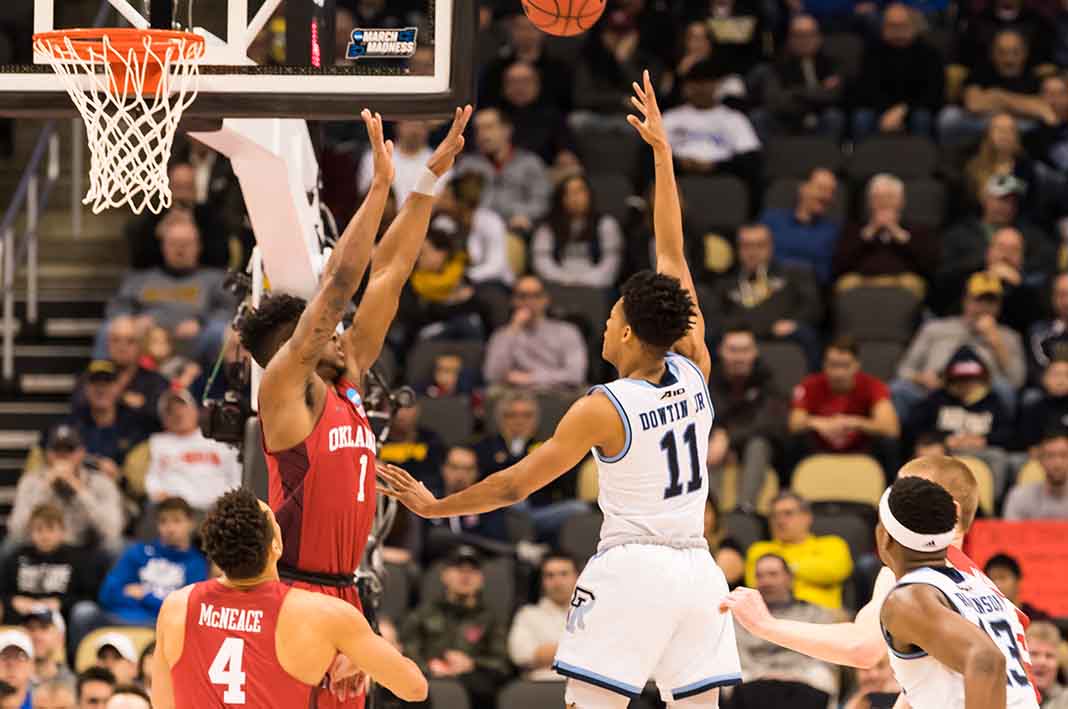
CD: Let’s talk leadership. What does that term mean to you?
JD: For me, it’s like being a big brother for freshmen and the sophomores. They’re going to look up to me, I’m going to have to guide them and lead them. They’re going to ask me questions… and I’m going to have to mentor them because I’ve been in this moment before. They may be nervous in some situations, but it’s my job to push them and make sure they’re ready for the moment because we’re going to need it this year.
CD: Great point. You guys put a hurting on a lot of teams last year but are now younger, but very much the hunted because of what you’ve accomplished. You talked about helping the new guys step up and respond, so how do you impress upon them to be ready?
JD: I tell them all the time that the goal for us is to make it back to the NCAA Tournament, win the Atlantic 10 Championship — all of that. A few of us have been there before so we know what it takes to get there and the freshmen are willing to work and learn from us. They want to get right back to where we were and not be any drop-off. They’re focused, locked-in and know that we know what it takes… so they’ll be behind us all the way.
CD: Speaking of the freshmen, anything you’d like to share on how those guys are progressing? Any in particular you want to mention?
JD: [Laughs] I’m not going to single any one of them out. I really think all of them can make a huge difference in our season this year. They’re in the gym constantly working and getting prepared for the season so I’d say to the fans, “be ready.”
CD: You just answered that question straight down the middle… textbook. Well done. Okay, what’s the schedule for the rest of the summer?
JD: We’ve been doing individual workouts for the first few weeks and trying to get in skill work. The next summer session will be team-oriented, trying to get the freshmen used to the college lifestyle… We’re here until the end of July and then go home for a little while. Then right back… and it’s time to get to work.
CD: Last one; I know you all have had guys stop in like Xavier Munford, Hassan Martin and others. How important is it and what does it mean for the new freshmen to have these guys who have been successful come back to Kingston to visit?
JD: I mean a lot. It shows us the type of atmosphere we have, the type of family bond we’ve built here… Everybody loves to come back and give back to the community. It shows we have a strong connection, that we love one another, and that really means a lot.


